Preparing for Auditions (In the Audition)
Preparing for Auditions (In the Audition)
1) Make music:
So the moment has finally arrived that you have been preparing for countless hours. This is your five minutes to shine, so make the most of it. Of course you have to play in tune, in time, and with quality, but you also need to play musically. Contrary to what some people think-that the panel wants errorless robotic playing-the committee still wants to hear a beautiful, musical performance.
There are better times than others to do this-you probably don’t want to take any liberties in the Schumann Scherzo. So, your concerto is a great opportunity to make a great first impression. After playing your concerto, the committee has basically made up their mind about you anyways (if they didn’t already do that just from hearing you tune. A teacher of mine once even said he could tell a lot about a person’s playing just from watching them enter the room!)
So, go for it! Play beautifully and play musically.
2) Don’t stop until you are SURE the panel has asked you to stop.
While you are playing, you may hear the panel on the other side of the screen talking or making noise. They might be discussing your playing, or they might be ordering lunch. Whatever is going on back there, keep playing until you very distinctly hear someone shout “Thank you!” or something similar.
It is very awkward if you stop playing because you thought you heard something. You’ll have to start up again, and they might think you stopped because you messed up, or didn’t learn the rest etc.
When in doubt, just keep playing and let the panel shout a second or third time. If you really can’t hear them, the proctor will start waving at you or something. It’s much better to err on the side of over playing, than cutting it short (assuming you know all the music)
3) Move through the excerpts in a timely manner, but don’t rush yourself.
It’s important that before starting each excerpt you give yourself enough time to set the tempo, check the key signature, find the starting note, and remind yourself of any instructions pertaining to each excerpt (i.e. “Don’t rush,” or “start from the string”)
Switching between excerpts and getting set to play should happen in a timely manner, and hopefully be something you’ve practiced. If you just jump from one to another without thinking, you’ll likely be half way through the excerpt before realizing that you started in a terrible tempo and it will be too late to adjust.
If you take too long in between each excerpt, the panel will probably get frustrated and either cut your playing short, or conclude your audition before you have played every excerpt-that is not a good thing.
What is especially difficult about auditions is switching between styles across hundreds of years (i.e. from Bach to Shostakovich) in a manner of seconds. When you start an excerpt from the fourth movement, you have to sound like you already played the first three movements. What might be easy in context suddenly is not so easy out of context.
So, convincingly switching between excerpts and styles in a timely manner is a very big part of audition success.
4) If asked for sight-reading, prepare adequately in your head before playing.
Nothing strikes fear into the heart of musicians like Sight-Reading. Most musicians dread sight-reading in auditions, so you’re not alone. If someone tells you that they like sight-reading, ask them if they like pickled herring and fruitcakes-also consider buying a lottery ticket because you’ve got great odds.
So, here are a few suggestions to help your sight-reading experience go better:
• Figure out who the composer is. If it’s not visible at the top of the page, try asking the proctor.
• 1) Rhythm 2) Dynamics 3) Notes- This is a good rule of thumb for both orchestral playing, but also for sight-reading. Take a minute before you start playing and really establish your time signature and a tempo you can feasibly take. Look for passages with 16th notes or triplets to gauge how fast you should begin. Don’t ask the panel for a tempo-find one that works for you, and if you’re way off, they might ask you to do it again.
• Conduct and sing it in your head before you start playing. If you can’t sing it, forget about it going well when you try with your instrument-ain’t gonna happen. You probably don’t have time to sing through the entire piece, so make sure you have the first few measures figured out.
• Scan for tricky sections. Watch out for any key signature changes, or time signature changes. Also scan for difficult passages and try to figure out what you’re going to do before you play it.
• Don’t stop…Believing….Hold on to that feeling! Yes, Journey has some sage advice about sight-reading. Keep playing-even if you mess up, who cares if you missed that one note-get the next one. If you have no idea what the piece is, you may be more accurate than you think. The panel knows you are sight-reading, so go for broke, you’ve got nothing to lose.
5) After the audition, start practicing for the 2nd round.
Congratulations, you just finished your audition! Now get ready to do it again!
Well, you should definitely take some time to relax and recover, you’ll probably be pretty tired.
The most important thing I can tell you is, “it ain’t over, ‘til it’s over”
You may think that you bombed it and that you should start considering teaching snotty little children in some backwards remote country, but you need to stick around until the personnel manager posts the list of who is advancing. I’ve heard so many stories of people who thought they were done, packed up and started driving home, only to advance, and then the PM had to call them up, and they had to race back and play again.
Instead, after you finish the first round and have rested for a little while, start warming up again for the next round. You don’t have to do anything super intense, just be ready for the possibility that as soon as the PM posts the list, you may be the first to play. Sometimes they start the second round immediately after posting it, sometimes they set a time that it will start.
I hope these suggestions will help you have a successful audition experience, I would love to hear your feedback or stories in the comment section below.

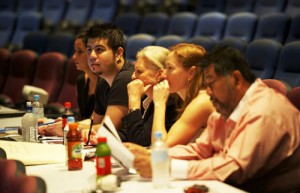
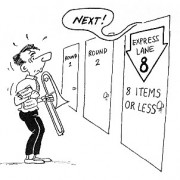

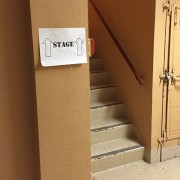
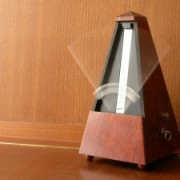
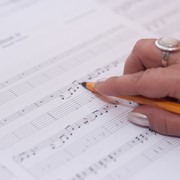




Comments are closed.